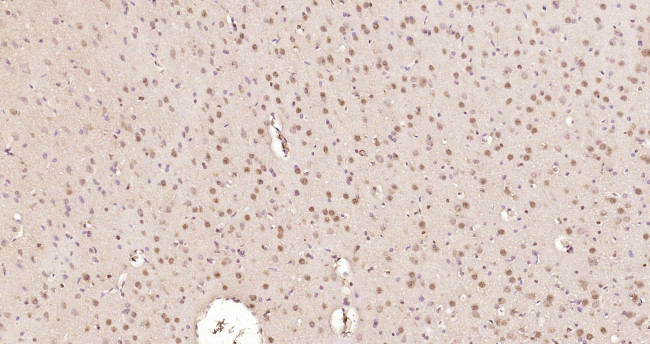Search Thermo Fisher Scientific
FIGURE: 1 / 1
Ataxin 7 Antibody (BS-11318R) in IHC (P)

Product Details
BS-11318R
Species Reactivity
Host/Isotype
Class
Type
Immunogen
Conjugate
Form
Concentration
Purification
Storage buffer
Contains
Storage conditions
Shipping conditions
Target Information
Spinocerebellar ataxia type 7 (SCA7) belongs to a class of hereditary neurodegenrative diseases characterized by abnormally expanded polyglutamine (CAG) repeats at the N-terminus. This autosomal dominant cerebellar ataxia primarily affects the cerebellum, retina, and brain stem and causes dementia, macular degeneration and other neurodegenerative characteristics. SCA7 gene encodes the ubiquitous 892 residue protein ataxin-7. This protein is typically located in the cytoplasm and on the nuclear membrane of normal brain neurons. In cells where there is a mutation of the SCA7 gene, ataxin 7 accumulates in intranuclear inclusions and can result in cell death.
For Research Use Only. Not for use in diagnostic procedures. Not for resale without express authorization.
References (0)
Bioinformatics
Protein Aliases: ataxin 7; Ataxin-7; spinocerebellar ataxia 7 homolog; Spinocerebellar ataxia type 7 protein; Spinocerebellar ataxia type 7 protein homolog
Gene Aliases: A430107N12Rik; ADCAII; AI627028; ataxin-7; ATXN7; OPCA3; RGD1562692; SCA7
UniProt ID: (Human) O15265, (Mouse) Q8R4I1
Entrez Gene ID: (Human) 6314, (Mouse) 246103, (Rat) 361015

Performance Guarantee
If an Invitrogen™ antibody doesn't perform as described on our website or datasheet,we'll replace the product at no cost to you, or provide you with a credit for a future purchase.*
Learn more
We're here to help
Get expert recommendations for common problems or connect directly with an on staff expert for technical assistance related to applications, equipment and general product use.
Contact tech support
